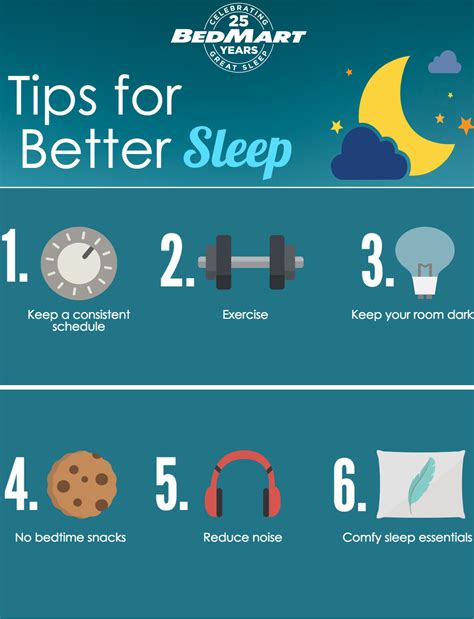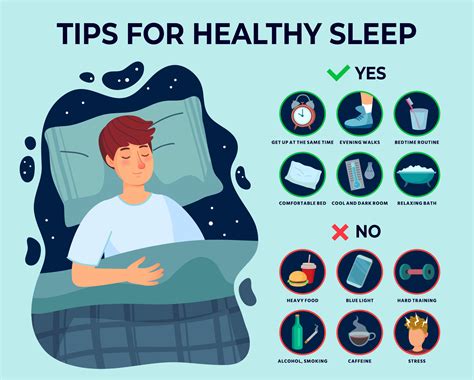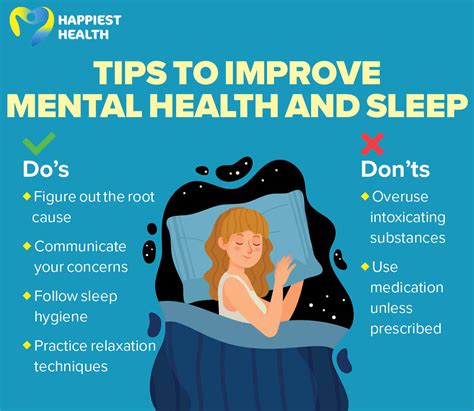Intro
Improve sleep quality with 7 proven methods, including relaxation techniques, sleep schedule management, and creating a sleep-conducive environment, to enhance overall well-being and wake up feeling refreshed.
Sleep is a fundamental aspect of our lives, playing a critical role in our physical and mental health. During sleep, our bodies repair and regenerate tissues, build bone and muscle, and strengthen our immune systems. Sleep also affects our brain function, with research showing that it helps with the clearance of toxins that can lead to neurodegenerative diseases. Despite its importance, many of us struggle with getting a good night's sleep, leading to fatigue, decreased productivity, and a range of other health issues. Understanding the importance of sleep and implementing strategies to improve sleep quality is essential for overall well-being.
The consequences of poor sleep can be far-reaching, impacting not just our health but also our relationships, work performance, and daily activities. Lack of sleep can lead to mood disturbances, decreased cognitive function, and an increased risk of accidents and errors. Furthermore, chronic sleep deprivation has been linked to an increased risk of obesity, diabetes, and cardiovascular disease, highlighting the need for effective sleep strategies. By focusing on creating a sleep-conducive environment, establishing a consistent sleep schedule, and practicing relaxation techniques, individuals can significantly improve the quality of their sleep.
Improving sleep quality requires a multifaceted approach that incorporates lifestyle changes, environmental adjustments, and psychological techniques. From creating a relaxing bedtime routine to avoiding stimulating activities before bedtime, there are numerous ways to enhance sleep. Additionally, understanding the science behind sleep and the factors that influence it can provide valuable insights into developing personalized strategies. Whether it's managing stress, optimizing the sleep environment, or seeking professional help when needed, taking proactive steps towards better sleep is crucial for achieving optimal health and wellness.
Understanding Sleep Basics

Stages of Sleep
Sleep is divided into two main types: REM (rapid eye movement) sleep and NREM (non-rapid eye movement) sleep, each playing a distinct role in physical and mental restoration. REM sleep is characterized by brain activity similar to that of being awake, vivid dreams, and paralysis of the muscles to prevent acting out dreams. NREM sleep, on the other hand, is marked by slower brain waves, less dreaming, and higher arousal thresholds, making it easier to wake up. A typical sleep cycle lasts about 90-120 minutes, with three stages of NREM sleep followed by a stage of REM sleep, repeating throughout the night.Strategies for Better Sleep

- Establish a Consistent Sleep Schedule: Going to bed and waking up at the same time every day, including weekends, helps regulate the body's internal clock and can improve the quality of sleep.
- Create a Sleep-Conducive Environment: This includes ensuring the bedroom is dark, quiet, and at a comfortable temperature. Investing in a comfortable mattress and pillows can also make a significant difference.
- Develop a Relaxing Bedtime Routine: Activities like reading, meditation, or a warm bath can signal the body that it's time to sleep, making it easier to fall asleep and stay asleep.
- Limit Exposure to Screens Before Bed: The blue light emitted by smartphones, tablets, and computers can suppress the production of melatonin, the hormone that regulates sleep. Using blue light filtering glasses, apps, or software can help mitigate this effect.
- Avoid Stimulating Activities and Substances Before Bedtime: Avoid consuming caffeine, nicotine, and heavy meals close to bedtime, as they can disrupt sleep patterns.
- Get Regular Exercise: Regular physical activity can help improve sleep quality, but it's recommended to finish workouts a few hours before bedtime to allow the body time to wind down.
- Manage Stress: Engage in stress-reducing activities, such as yoga, meditation, or deep breathing exercises, to help clear your mind and relax your body before sleep.
Benefits of Better Sleep
Better sleep has a wide range of benefits, including improved physical health, enhanced mental clarity and focus, and a stronger immune system. Good sleep quality is also associated with better mood regulation, reduced stress, and a lower risk of chronic diseases. Furthermore, sleeping well can improve cognitive function, including concentration, memory, and problem-solving skills, making it essential for academic and professional success.Overcoming Sleep Challenges

Seeking Professional Help
If sleep problems persist, consulting a healthcare professional is an important step. They can help identify underlying causes of sleep disturbances and recommend appropriate treatments, which may include behavioral therapies, sleep aids, or lifestyle adjustments. In some cases, sleep studies may be necessary to diagnose sleep disorders accurately.Creating a Sleep-Friendly Lifestyle

Diet and Sleep
Diet plays a significant role in sleep quality. Consuming a balanced diet rich in fruits, vegetables, whole grains, and lean proteins can support better sleep. Certain nutrients, such as melatonin found in cherries, walnuts, and olive oil, and serotonin found in complex carbohydrates, can promote relaxation and improve sleep quality. Avoiding foods that can disrupt sleep, such as those high in sugar, caffeine, and saturated fats, is also recommended.Technological Solutions for Sleep

Wearable Devices and Sleep Tracking
Wearable devices, such as smartwatches and fitness trackers, can monitor sleep patterns, including duration, stages of sleep, and sleep quality. This data can provide valuable insights into sleep habits, helping individuals identify areas for improvement and track the effectiveness of sleep strategies over time.Mental Health and Sleep

Cognitive Behavioral Therapy for Insomnia (CBT-I)
Cognitive Behavioral Therapy for Insomnia (CBT-I) is a non-pharmacological approach that has been shown to be highly effective in addressing insomnia and other sleep disorders. It involves identifying and changing negative thought patterns and behaviors that contribute to sleep difficulties, promoting healthier sleep habits and improving sleep quality.Conclusion and Next Steps

As you reflect on your own sleep habits and consider the strategies outlined here, remember that small changes can add up over time. Start with what feels manageable, and gradually work towards creating a sleep-friendly lifestyle that supports your physical and mental health. Share your experiences, tips, and questions in the comments below, and let's work together towards achieving the restful sleep we all deserve.
What are the most common sleep disorders?
+Insomnia, sleep apnea, restless leg syndrome, and narcolepsy are among the most common sleep disorders. Each has distinct symptoms and requires specific treatments.
How does diet affect sleep quality?
+Diet plays a significant role in sleep quality. Consuming a balanced diet rich in fruits, vegetables, whole grains, and lean proteins can support better sleep. Avoiding foods high in sugar, caffeine, and saturated fats is also recommended.
What is the importance of a consistent sleep schedule?
+A consistent sleep schedule helps regulate the body's internal clock, leading to improved sleep quality, better physical and mental health, and increased productivity.
